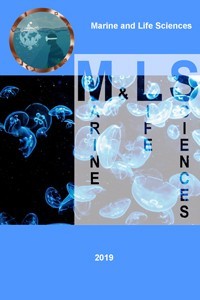
Marine and Life Sciences
Yazarlar: Ahu Deniz ULUDAĞ, Mevlüt AKTAŞ
Konular:Üreme Biyolojisi
DOI:10.51756/marlife.1026198
Anahtar Kelimeler:Farfantepenaeus aztecus,Salinity,Larvae,Micro-algae,Culture
Özet: This study was designed to determine the effects of five different salinity levels (25, 30, 35, 40 and 45 ppt) on the survival rate of Farfantepenaeus aztecus larvae from Nauplius5 to post-larvae1 (N5-PL1). For this purpose, 50 larvae that reached the N5 stage were stocked in 2-L round bottom glass flasks in five replications and were grown up to the PL1 stage at 27.6±0.4°C. At the end of the study, as the highest survival (44.00±23.15) in protozoal stages were obtained at 35 ppt salinity levels, the lowest survival 14.00±4.89) were found at 25 ppt salinity levels (P<0.05). The highest survival rates from the M1 stage to the PL1 stage was obtained at 35 ppt (24.40±19.51), 30 ppt (23.20±18.14) and 40 ppt, respectively. The survival rates at 25 and 45 ppt salinity levels were found statistically different from those of 30, 35, and 40 ppt (P<0.05). The results of this study show for the first time that the optimum salinity level is the range of 30-40 ppt for larval culture obtained from the North-eastern Mediterranean population of brown shrimp that is the West Atlantic natural origin.